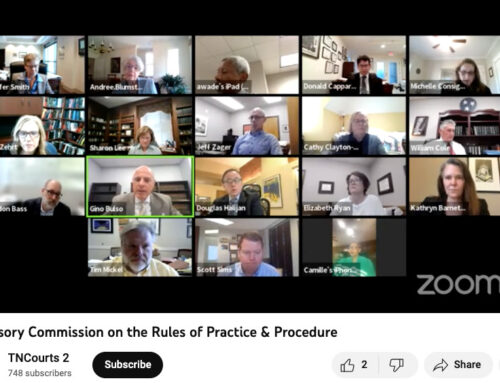Gov. Bill Lee has decided to extend his order suspending parts of the Open Meetings Act to allow governing bodies to continue to meet electronically through Aug. 29.
In order No. 51, Lee said extending the order is warranted because COVID-19 “remains a threat and it’s imperative to ensure gatherings are conducted in a safe way … without creating large gatherings in a confined space and endangering persons, particularly those at increased risk of suffering severe illness from COVID-19 while determinations of how best to return to safe, in-person governmental meetings remain ongoing.”
So what’s a citizen to do?
We’ve learned a lot over the past three months as governing bodies across the state have started conducting meetings by video and phone (some good, some bad). One important thing we’ve learned: Electronic meetings done poorly can create distance between members of governing bodies and the public they represent. And this reduces trust, transparency and accountability.
The public should expect better.
Below is a checklist. If your governing body isn’t doing these things, contact them and ask that they improve. You can let us know, too, by sending us an email to [email protected].
Is the meeting accessible to the public as it is going on? For an electronic meeting to be accessible to the public, the public has to be able to attend it as it is going on. In the beginning, some governing bodies who had no experience with technology might have struggled with this. But by now — three months into electronic meetings — all governing bodies should have figured this out. All governing bodies should by now be conducting meetings that allow live public access. This includes committee meetings, such as the budget finance committee of a city council. Sometimes these committee meetings are the most important for the public to attend.
Do members of the public have an option to view the meeting, as well as just hear it? One thing we’ve learned in the three months of the electronic meetings is that it is important for the public to know who is speaking when they speak. They need to be able to see each member of the governing body and clearly hear them. This should be non-negotiable. Members of governing bodies should be visible to other members of the governing body — and they should be visible to the constituents they represent — during the entire meeting.
Are there multiple ways for people to access the meeting electronically? Electronic meetings are not ideal. However, governing bodies who plan to conduct them should offer live-streaming over the web, call-in lines for those in the public without good web service, and video and audio recordings of the meeting immediately after the meeting, as well as the meeting minutes, or draft minutes. Recordings and minutes should be emailed to citizens, if they request it, or mailed, as well as available for pickup. All of these together provide multiple ways for the public to access the meeting, no matter their level of technology.
Do the governing bodies offer a way for the public to give public comment? When the governor’s executive order was first issued in March, it did not mention how governing bodies should conduct their traditional public comment sections. This part of the meeting is important to the public. Public comment needs to be replicated as closely as possible in the electronic space. That means, all the governing body members must be present (with their video on) and members of the public should be able to be seen and heard as they deliver their public comment.
Do the governing bodies make their agendas widely accessible to the public before the meeting, such as on their website? If they are not doing this, they need to start immediately. It is already difficult for members of the public to access an agenda that clearly outlines what a governing body is planning to discuss or take action on. And without an agenda, it can be hard to figure out in an electronic meeting what’s going on. At a physical meeting, for example, you are often able to pick up a copy of the agenda. Not so, at an electronic meeting, and it’s even harder when they are reviewing documents just emailed to them (but not available to the public beforehand). Many governing bodies have websites. They need to post their agendas on the websites in easily findable places, and they need to include details. If they do not have a website, they need to work with someone in their community who can post the agenda (such as their local news media) or post it on a Facebook page. In general, the governing body needs to be aware of its responsibility to proactively make these meeting documents easily available to the public.
Does the governing body allow a way to interact with members of the governing body? Some governing bodies do not have public comment periods. For a citizen, the only way to contact a member of the governing body is if there is a phone number available, such as on a website, or if they attend the meeting physically and meet the representative in-person. Electronic meetings create new distance between elected and appointed officials and the citizens they represent. Oftentimes, physical meetings are the only times a member of the governing body is available publicly. They need a method to be available to the public, either during the electronic meeting or in some other way.
Is the governing body conducting electronic meetings when it’s clear they could safely conduct meetings in person? Some governing bodies could clearly, right now, conduct meetings in person safely. Businesses and other organizations (such as churches and our own Tennessee House of Representatives) have taken appropriate measures such as requiring people wear masks, have their temperature taken before they come in, and follow social distancing requirements while there. Some governing bodies are in cities and towns not touched by the virus. Some governing bodies have mitigated risk by creating a public option of electronic access to reduce the number of people who may otherwise come in person. While situations differ, a clear-headed consideration of whether government business can be conducted in a safe manner in person in front of the public should be considered.




